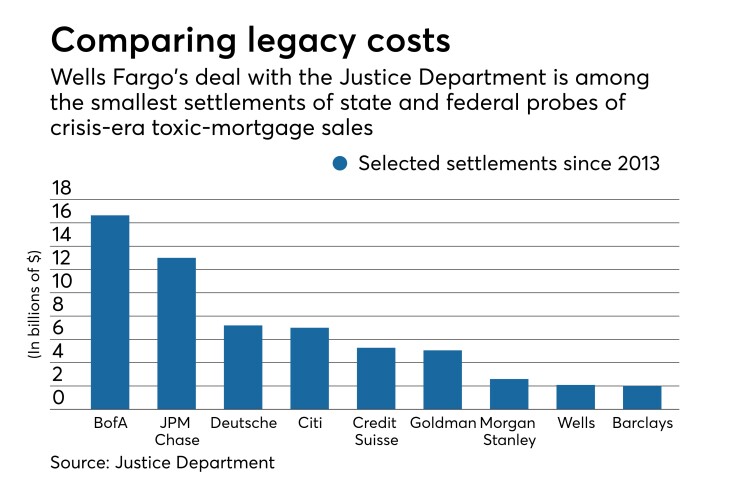The industry breathed a sigh of relief Wednesday at the expense of Wells Fargo.
The beleaguered bank's $2.09 billion settlement stemmed from crisis-era mortgage problems, rather than revelations of new issues at Wells that could have sparked a regulatory backlash or probe that might cause headaches for other banks.
Even more important for the industry, the closure of the Wells case appears to mark the end of the parade of headlines about multibillion-dollar settlements with big U.S. banks that had endured since the subprime mortgage meltdown a decade ago. Wells was likely the last of the big cases to be cleared by the Justice Department, analysts said.
“I believe this is it,” said Scott Siefers, an analyst with Sandler O’Neill.

Wells' big-bank peers — JPMorgan Chase, Bank of America and Citigroup — all settled similar cases for much larger amounts with the Obama administration.
BofA and JPMorgan, for instance, reached settlements of $17 billion and $13 billion, respectively.
More recently, under the Trump administration, the Justice Department has reached a string of smaller settlements over the past year, particularly with foreign-owned banks, such as Barclays and Deutsche Bank. That may be a sign that the department is clearing the decks on its decade-old mortgages cases.
The relatively small size of Wells’ settlement, in particular, may highlight the benefit of fighting back against charges at the onset, and then settling for less later on, according to Brian Kleinhanzl, an analyst with Keefe, Bruyette & Woods.
“You have to think about the financial crisis,” Kleinhanzl, said. “You learn that, maybe, there’s a benefit to settling later.”
The settlement comes at a precarious time for Wells, which is battling legal and reputational battles on a number of fronts.
The San Francisco company
Meanwhile, Wells remains under an asset cap imposed by the Federal Reserve. The company also recently disclosed that it
At issue in the newly settled case were mortgages containing faulty information about borrowers’ incomes that, according to the Justice Department, Wells knowingly sold to investors.
In a press release Wednesday, CEO Tim Sloan said the company — the nation’s second-largest retail mortgage lender — is “pleased” to settle the matter.
“Wells Fargo remains focused on our important role as one of the nation’s leading providers of mortgage financing and our commitment to expanding sustainable homeownership opportunities for our customers,” Sloan said.
Wells said it has fully reserved for the cost of the settlement. The company late last year set aside roughly $3 billion to cover the Justice Department’s probe into residential mortgage-backed securities.
“This was very much expected,” said Jason Goldberg, an analyst with Barclays, in an email, commenting on the settlement.
Companies typically do not release excess reserves related to legal matters, but they can draw on any excess funds for future settlements, according to Kleinhanzl. As Wells navigates a slew of legal matters, it could put its roughly $1 billion in excess reserves stemming from the mortgage settlement to use.
Analysts said the settlement announced Wednesday stemmed, in part, from mortgages that were made by Wachovia, the Charlotte, N.C., company Wells bought in 2009, at the height of the crisis.
In 2005, as the mortgage market was heating up, Wells boosted the production of subprime and Alt-A loans, which required minimum documentation from borrowers. During that time, Wells also loosened its underwriting requirements on loans that required borrowers to state their incomes, according to the Justice Department.
Internal testing conducted at the time by Wells showed that 70% of loans that required income documentation showed an “unacceptable” variance between the annual income that the borrower reported to the bank and the annual income reported on tax returns on file with the Internal Revenue Service, according the department.
Wells, however, failed to disclose the evidence that borrowers falsified income to investors who purchased the loans.
“Abuses in the mortgage-backed securities industry led to a financial crisis that devastated millions of Americans,” Alex Tse, acting U.S. attorney for the Northern District of California, said n a press release announcing the settlement. “Today’s agreement holds Wells Fargo responsible for originating and selling tens of thousands of loans that were packaged into securities and subsequently defaulted.”





